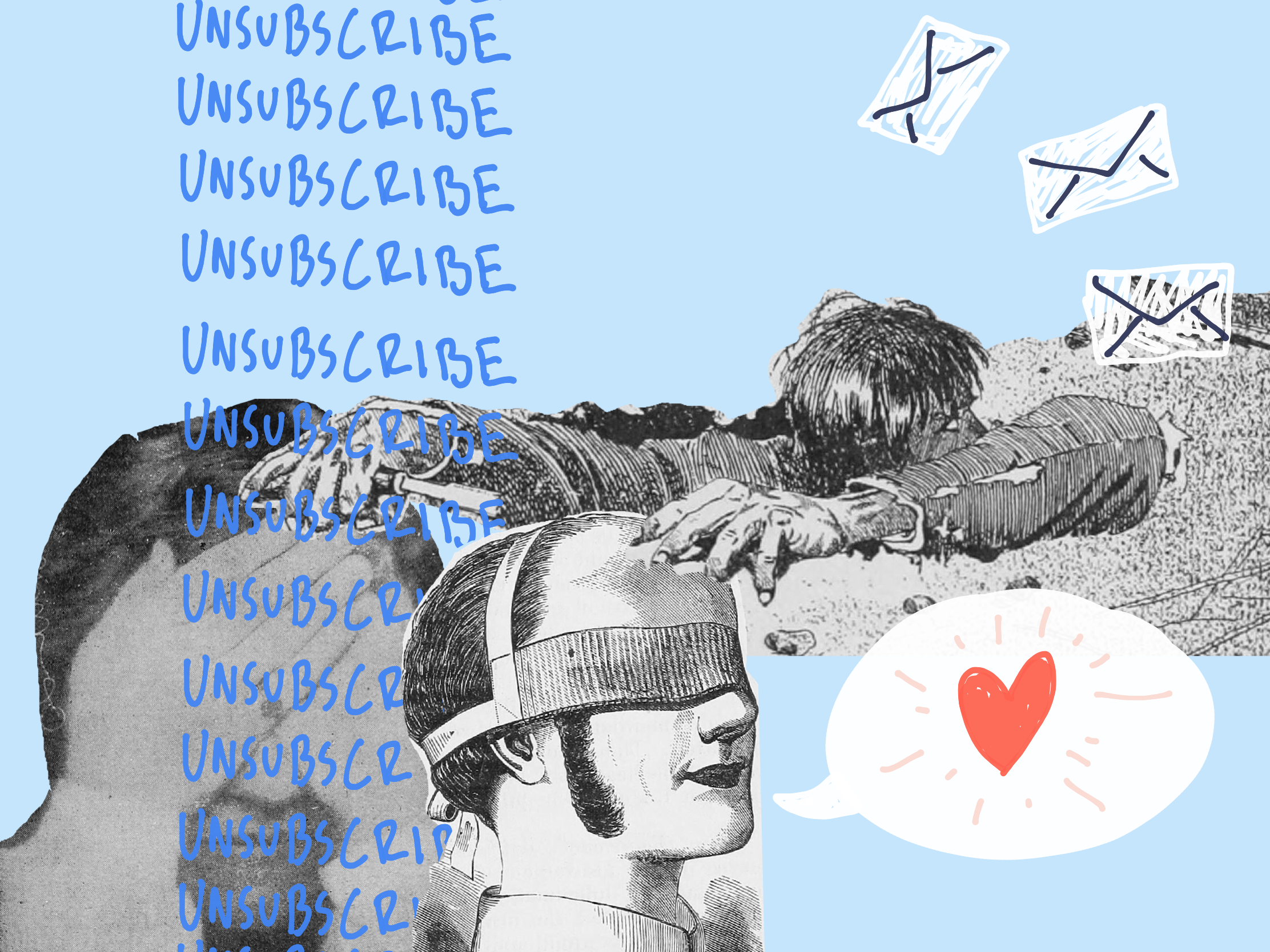My Blog
Unsubscribe Often

A few years ago, I wrote a post called Subscribe to Everything wherein I encouraged email marketers, designers, developers, etc. subscribed to, quite literally, every email form that they stumbled upon. Except the really shady looking ones, of course.
It’s advice I still give all of the time. During webinars, conference talks, in Slack chats. I stand by it.
But I wanted to offer a quick addendum. And that is:
Subscribe to everything. Unsubscribe often.
You should totally subscribe to lots of email lists to keep an eye on what people are sending, what they’re saying, and how they’re marketing to their subscribers. But don’t feel guilty unsubscribing from lists that just don’t do anything for you.
A lot of email marketers are still sending out shitty emails. Bad copywriting, poorly thought out strategy, broken and boring designs.
Unsubscribe from them.
You probably won’t be learning anything new from their emails and the clutter in your inbox is likely adding unnecessary anxiety to your life. Cut the digital clutter, cut the mental clutter, and feel better.
RIP RBG

Supreme Court Justice Ruth Bader Ginsburg died. It’s an immense loss for our country.
Not only because RBG was a force for good but because her passing presents an opportunity for the Trump administration and the GOP to force through another Supreme Court nomination, one that will almost certainly set our country back decades, for decades to come. While it can be tempting to throw our collective hands up and scream “we’re fucked!”, it’s more important to fight. It’s what RBG did and it’s the best way to honor her memory.
If there’s a single moment in 2020 that’s deserving of your attention and your time, it’s this moment. Now is what writing to and calling your representatives was made for.
Regardless of how you do it (I’m a huge fan of Resistbot), contact your representatives and urge them to fight any attempt at a Supreme Court confirmation until after the inauguration in January. Not sure what to write? Here’s what I sent to my representatives tonight. Copying and pasting is welcome.
As a patriot and representative of your fellow citizens, I’m sure that you are mourning the death of Supreme Court Justice Ruth Bader Ginsburg. It’s a sad day for America, especially considering the current administration’s commitment to undermining our institutions and democracy itself.
I am terrified of the consequences of the Trump administration’s opportunity to appoint another close-minded conservative to the Supreme Court and urge you to follow the precedent set after the death of Justice Scalia four years ago, the one set by Mitch McConnell wherein he stated that the Senate couldn’t even consider appointing a new Justice in an election year. It is a virtual certainty that he and the GOP-controlled Senate will reverse their own precedent and try to force through a confirmation with only weeks left before the election.
I urge you to fight—with every tool at your disposal—any attempt by the GOP to confirm a new Supreme Court Justice. It’s a move that has the potential to set our country back an unprecedented amount for decades to come.
This is one fight that cannot be lost.
I Love Swearing

My last post was about a talk I gave at UNSPAM right before the pandemic hit in force. It was titled, “How the hell do you get (and keep) email subscribers?” and had to do with list acquisition and engagement techniques.
One of the responses I received was taking issue with my choice of language in the title (and, presumably, the talk itself). The email I received was thoughtful and respectful and it made me think more deeply about the issue than I expected.
The argument basically boiled down to:
- Swearing is unprofessional
- It can offend religious and conservative people
It took me quite a while to respond to the email and the argument. I ran my response by my wife and a few trusted friends. My wife, especially, encouraged me to post it here, so here we are. I’ve removed any mention of names or identifying details but, otherwise, this is the email in full:
I love swear words and think they’re extremely useful parts of language. They can be used to express so many different feelings far more quickly than cleaner language. I actually take issue with the phrase “bad language” and favor “adult language” when talking about it with my kids, since swearing can be used for plenty of good but should probably only be used by adults since they have the experience to fully understand the meaning of those words and the context surrounding them.
You’re right that “hell” was used to express frustration with one aspect of email marketing and to grab attention. In both cases, a swear word was the perfect rhetorical tool to use. And, as I was at the RGE conference, it was kind of on brand and a good fit for the audience, which leans towards the rambunctious.
Although my choice of language can lead to some being offended, I don’t agree that it is inherently offensive. “Hell” is one of the milder entries in the lexicon of adult language (I used worse in the actual presentation) and is commonly used in articles, advertisements, and in television and movies. I’d wager that it’s frequently used in professional settings without much issue. And, even when it causes some discomfort, that can be a good thing. As the American author Jason Reynolds says:
If you can’t put yourself in a situation where you are uncomfortable, then you will never grow.
Hopefully people—even in a professional setting—can see past a few swear words and take issue with any ideas expressed in the session as opposed to the language I choose to convey some of those ideas.
Again, I really do appreciate your email, as it made me think deeper about what I write, say, and put out into the world. And I’m thrilled that you find value in a lot of what I create and share (and the RGE team, which does awesome work), so I hope you don’t dismiss future articles and talks from me or RGE, even if it contains some adult language.
I don’t plan on cleaning up my language moving forward—in part because I don’t think it’s dirty language to begin with—but I’d love to hear what you think about the issue. Does adult language have a place in professional settings? Email me and let me know.
How the hell do you get (and keep) email subscribers?
The fine folks over at Really Good Emails have been releasing a lot of great videos on their YouTube channel, the most recent of which was my impromptu session at this year’s UNSPAM conference.
For anyone who wasn’t there, I served as a (truly) last-minute fill in. UNSPAM was during the last week most things were open in the US prior to the lockdowns that took effect right after we all got home. A speaker dropping out at the last minute was inevitable and justified. Mike and Matthew asked me to fill in, so I put together a talk really, really quickly.
That talk can be seen here:
RGE also went through and transcribed everything, syncing it all up to my slides. I love this format, so thanks for putting it all together. 🙏
Nine Minutes
9 minutes.
9 fucking minutes.
A white police officer—someone tasked with serving and protecting his community—knelt on George Floyd’s neck for 9 minutes, 8 days ago. In front of three other officers and people filming the entire event, pleading with him to stop as George Floyd begged for his life, he murdered a Black man.
The country has erupted in response—and rightly so.
George Floyd’s murder is only the latest example of police—subsidized by local, state, and the federal government—targeting and attacking the Black community. It’s a massive problem and one that’s being ignored by most politicians. And, in the case of the president, a problem being stoked by racist, fascist rhetoric and violent actions against largely peaceful protests.
I’m privileged to be white, live in an area of the country that’s relatively safe, have local and state representatives that have spoken out and voted against police brutality and racism, and have a buffer that most people in the country don’t. My family and I will never experience the kind of racism and brutality that George Floyd, and countless others, have. I’m grateful for that but I’m mad as hell that others will.
Like a lot of white people, I’ve been struggling with how to engage and make any difference in the face of such huge problems. While donating is something I can, have, and will continue to do, it seems insignificant. Fortunately, people have been putting in the work to give everyone options for how to help right now.
For those who can donate money, do it. There is no shortage of organizations helping fight police brutality, corrupt politicians, and systemic racism that need more money. Start giving whatever you can.
Listen to podcasts? Try some new ones. It’s not just white guys (including me) making podcasts. Diversify your listening.
Read books about racism, its structures, and its effects. Racism has a long and complicated history, and its effects manifest in so many different ways. Thankfully, we have a lot of authors tackling the subject from various angles. Tatiana Mac has a great list of options. And if you have kids, try some of these instead of Dr. Seuss for the 598th time.
Buy, consume, and share things made by Black creators. From books to comics, music, and movies, there’s tons of amazing work out there.
Encourage and amplify voices unlike your own. Especially in the tech, design, and marketing industries, where diversity is a massive problem. There are so many people doing amazing work. Talk to them and share it.
If you’re part of a marginalized group in the email, marketing, or tech community, respond to this email and let me know what you’re working on. I’d love to check it out and try to use my limited platform as much as possible to amplify your voice and work.
As Killer Mike said, now’s the time to plot, plan, strategize, organize, and mobilize. Even if you can’t donate money, donate at least 9 fucking minutes every day to writing to your representatives, educating yourself about race, amplifying marginalized voices that need to be heard, and supporting the Black community.
Be safe and be smart. But stay angry and get active.
No Time to Prep

For a lot of reasons (COVID-19, restricted travel, a history with the organizers, etc.), I jumped in at the last minute to fill in for a speaker at UNSPAM (a Really Good Emails thang). Although I’ve filled in for other speakers plenty of times, there’s usually a week or more of prep time involved and I’ll sometimes recycle an existing talk so that I don’t have to create everything from scratch.
This time around, Mike asked if I could step in for a 3:30pm session at… lunch time.
Always up for a good challenge and happy to help, I gladly accepted. I was then immediately faced with the ridiculous question of, “How the hell do you put together a brand new conference talk in three hours?!?”
For anyone in a similar situation, I decided to document the process in the hopes of helping alleviate some stress.
Know Your Topic
When prepping for any talk, the biggest help is understanding what you’re going to be talking about. While I can confidently talk for hours on design and development topics, the UNSPAM agenda promised attendees a talk around subscriber acquisition, retention, and engagement. Three things I’ve thought a lot about over the years, but nothing I’ve ever given a public talk on.
Fortunately, the UNSPAM team and original speaker were happy to share the existing slides and Mike quickly walked me through what was originally planned (and bought me a great sandwich). Both allowed me to get up-to-speed on the topic, how it was framed for the UNSPAM audience, and gave me some valuable examples to use in my version of the presentation.
If the talk was on anything outside the email world (except maybe ukuleles or comics), my limited knowledge would never allow me to take on such a challenge. Knowing your topic—deeply and through various lenses—will allow you to tackle any presentation on the subject. Not exactly stress-free, but with reduced stress.
Mine Existing Resources
A lot of the prep for a talk (at least for me) is getting slides together. I freaking love a well-designed slide deck that doesn’t draw attention away from what the speaker is saying, but helps illustrate and reinforce those ideas instead. More often than not, it takes significant time to put a deck like that together.
On the flip side, I’m a designer and lover of design thinking, design systems, and problem solving. So you’d better believe that I’ve been working on streamlining my slide creation process. Over the years, I’ve built and rebuilt default slide templates for both personal and work uses. So, I hopped into Google Slides (my current tool of choice), made a copy of my default deck (which is still in progress), and started dumping in ideas loosely based on the original speaker’s structure.
Having existing resources to build on is a massive lifesaver. Without a slide deck theme largely built out, I probably couldn’t have delivered this talk on such short notice. And if I could, it’d be a much, much shittier version of it.
Building on that, I mined two of my favorite resources for content for those slides: My email account, where I keep a folder of interesting emails for exactly this type of situation, and the Litmus blog, where we keep a ton of resources on damned near any topic related to email marketing.
Combined, these three, existing resources allowed me to quickly work through ideas, find compelling examples, and design a presentation that looked good and supported those ideas.
Breathe
I don’t normally get too nervous talking in front of people, but with zero prep time (or only three hours…), the butterflies were definitely acting up. I hadn’t given a talk on exactly this topic, I was sharing some ideas from another speaker (who I’ve never met in person), and I was doing it to a room full of email geeks (my people).
While outwardly calm, inside I was a mess of nerves.
Before walking on stage, I did two things:
- Focused breathing, concentrating on the feeling of my breath moving in and out.
- Reminded myself that everyone in the audience wanted me to succeed.
Whether or not you’re all-in on meditation or think it’s hippy-dippy bullshit, focused breathing is a proven technique for calming nerves and helping to manage strong emotions. There are a lot of different techniques for breathing, so pick the one you like best and work it into your speaking routine.
And, it’s always good to remind yourself that no one is out to get you (usually). Everyone in the audience is there to learn and have a good time, so it’s unlikely that they’re actively wishing for a speaker to fail. Because of that, they’re likely to be understanding of the situation and forgiving of any mistakes during a talk.
Feel Like a Boss
The final step is to feel like a complete boss afterward. It’s stressful getting up on stage in front of others in the most ideal situations, so you can imagine what it’s like without much notice.
People will praise you, call you a legend (thanks, Dan), and congratulate you afterwards. Don’t minimize what you did, accept that praise, and feel good about accomplishing something instead.
Big shoutout to @RodriguezCommaJ, who managed to give a half-hour talk on audience acquisition at #unspam today on two hours notice. Dude’s a legend. pic.twitter.com/ln6X4hIKrL
— Dan Oshinsky (@danoshinsky) March 12, 2020
Even with little prep time, I hope that I was able to both educate and entertain my new friends at UNSPAM. Based on Twitter activity, I get the feeling that I did. It wasn’t my best talk ever, but I’m glad I was able to help out an awesome team and conference.
Note: Yes, the illustration up top is a reference to Cristina Gómez’s excellent design trends talk that kicked off the conference. Beige, blobs, plants…
Keeping a Speaker Profile

The other day, I put together a speaker profile. It looks like this and contains a bunch of stuff:
- My name, duh
- My preferred pronouns, because it’s important
- My contact info
- Short and long profiles
- A roundup of notable talks and publications
- Some choice pictures for folks to download
- And some nice things people have said about me
It may all seem like a vanity exercise, but I’ve found that a speaker profile serves a few purposes beyond stroking my own ego (although there is that, too).
First, I speak at a lot of conferences and routinely need to provide things like headshots and bios for websites and agendas. It’s a pain in the ass to write those things from scratch every time and hunt down headshots from old conferences. A speaker profile gives me one place to point organizers when they need something from me. It saves both of us a lot of time and allows them to grab what they need without having to bug me.
Second, a speaker profile allows people to vet me pretty quickly. If someone is trying to figure out whether or not they want me at their conference, on their webinar, or contributing to their blog, this is the quickest way for them to get a feel for what I’ve worked on. Providing a list of talk and article topics gives them something to quickly scan. Less back-and-forth on both of our parts and when a request does make it to me, it’s usually something I’m actually interested in since it aligns with my history and interests.
Third, it’s a great reminder of what I’ve accomplished. It’s easy to get burned out when you’re heads down on prepping for the next conference or workshop (not to mention organizing our own conference), and adding a talk to that page provides a kick in the pants in the form of inspiration. Although it’s not an exhaustive list of talks and publications, it’s cool to see a lot of the stuff I’ve done over the years collected in one document. Sure, there’s LinkedIn but who the fuck wants to troll that for inspiration?
Finally, it absolutely provides that ego boost. Yeah, yeah… I said it’s not just about vanity, but imposter syndrome is real for most people, including me. When I’m getting anxious about an upcoming gig or just don’t feel like I know what the hell I’m talking about, that doc is a great reminder that—although I make plenty of mistakes and get it all wrong sometimes—more often than not I know what I’m doing and people have faith in me.
I’ve created my speaker profile a few times: As a Notion page, a page on this very website, and a Google Doc. Right now, my about page links out to the Google Doc and I’ll probably keep it that way for the time being. Notion is an interesting tool, but I don’t think I can make it stick long term. And, while I like owning my data whenever possible and keeping things on my site, I like being able to quickly update my speaker profile in Google Docs as opposed to opening up the code in my website, making changes, and pushing a new commit.
I also know that there are tools out there to collect talks, like Speaker Deck, Notist, and SlideShare, but I don’t have faith in any of three to be around long term and I really like the simplicity of a simple doc as opposed to a full profile page with all the fancy graphics.
Use whatever tools you’d like, though, and put together your own speaker profile page. It will save you time, improve communication with organizers, and might just give you the boost you need when you’re feeling down.
Have one already? Send it my way, I’d love to see it.
What was your worst talk ever?

I’m fortunate in that outside of some laggy slides and a few spotty microphones, I haven’t had too much go wrong during a talk. In speaking to others—and having witnessed more than a few cringe-worthy conference sessions—I realize that I’m in the minority here. Most public speakers a number of horror stories to share.
Since I’m working on my next book, Speak Easier, which is obviously about public speaking, I wanted to do some more research into peoples’ experiences. Specifically, I’d love to hear all of those horror stories, whether they’re from a conference talk gone sideways, a terrible wedding toast, or anywhere in between.
I set up a quick form to fill out if you have a good (or not so good, I’m not picky) story to tell about your worst experience speaking in front of others. Don’t worry, I won’t share anything without your consent.